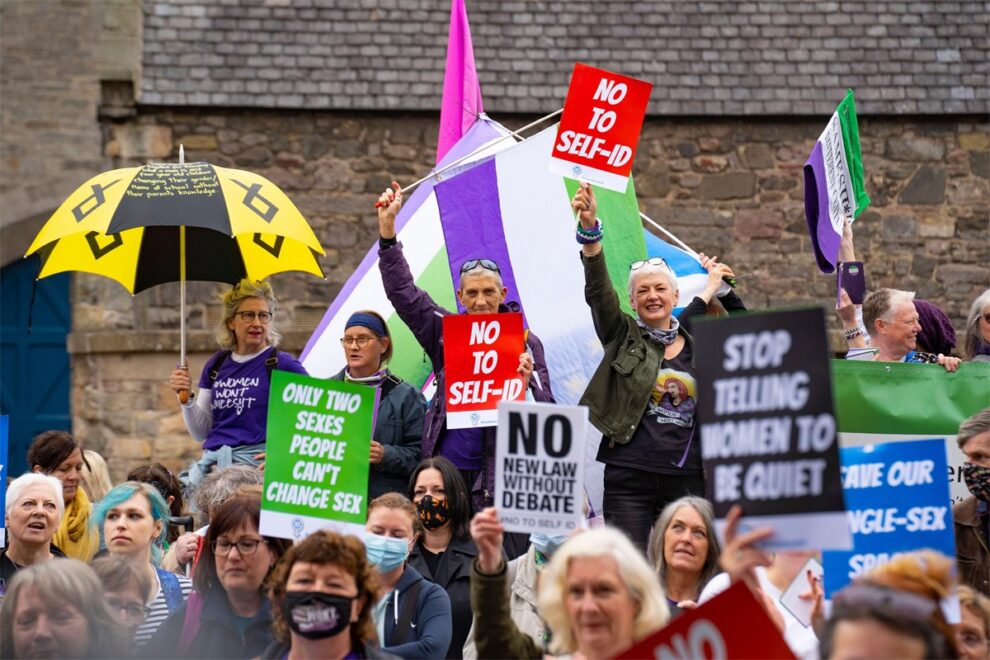The SNP Manifesto for the 2021 Scottish Parliament election included a commitment to developing a feminist foreign policy for Scotland. This would make Scotland “the first country in the UK, joining a small number of countries across the world, to adopt a feminist foreign policy.” The Programme for Government 2021-22 subsequently committed Scotland’s policies and actions abroad to being consistent with the Scottish Government’s “focus on fairness and inclusion at home.” It went on to state:
“We will create a new global affairs framework this year to guide Scotland’s international engagement, grounded in a values-based approach, and a feminist approach to foreign policy.”Programme for Government 2021-22 (Scottish Government)
While the participation of women and feminist movements in foreign policy has a longer history, the development of a feminist approach to foreign policy is relatively new for international governments. It is useful to explore what a feminist foreign policy actually means, where else it has been adopted, and what a “feminist approach to foreign policy” could look like for Scotland.
What does it Mean to Have a Feminist Approach to Foreign Policy?
Feminism advocates for political, economic, and social equality for women. However, the definitions of feminist foreign policy by organisations such as the Centre for Feminist Foreign Policy and the International Center for Research on Women go beyond this definition. For these organisations, a feminist approach to foreign policy includes:
- Moving away from what might traditionally come into mind when you think about foreign policy, like military force and violence.
- Prioritising topics like peace, gender equality, environmental issues, and human rights.
- Focusing on the wellbeing of the world’s most marginalised people, which includes women and girls.
- Thinking about foreign policy and international relations from the viewpoint of the world’s most vulnerable groups, thereby taking an intersectional approach to challenging existing power-structures such as racism, colonialism, and male-domination.
Where Else Has a Feminist Approach to Foreign Policy Been Adopted?
Sweden became the first country in the world to create and pursue a feminist foreign policy in 2014. Canada followed in 2017 with the launch of a Feminist International Assistance Policy. In 2020, Mexico launched a feminist foreign policy after pledging to adopt one in 2019. Scotland has joined France (2019), Luxembourg (2019), and Spain (2020) in pledging to adopt a feminist foreign policy. The Centre for Feminist Foreign Policy has produced a briefing on international commitments and the implementation of feminist foreign policy.
What Has This Looked Like?
Canada’s Feminist International Assistance Policy is a useful example of feminist foreign policy in practice. Marie-Claude Bibeau, Canada’s Minister of International Development and La Francophonie until March 2019, stated in the Feminist International Assistance Policy document that the Government of Canada believes supporting gender equality and the empowerment of women and girls is “the best way to build a more peaceful, more inclusive and more prosperous world.” The document’s executive summary states:
“Canada’s feminist international assistance will help protect and promote the human rights of all vulnerable and marginalized groups and increase their participation in equal decision making. This will help women and girls achieve more equitable access to and control over the resources they need to secure ongoing economic and social equality.”Feminist International Assistant Policy (Government of Canada)
As with other definitions of a feminist foreign policy, the document acknowledges that a feminist approach is “much more than focusing on women and girls”; a feminist foreign policy, the Government of Canada believes, is the “most effective way to fight the root causes of poverty that can affect everyone: inequality and exclusion.” The Feminist International Assistance Policy aims to benefit all people, not just women and girls.
The Policy has six action areas:
- Gender equality and the empowerment of women and girls (the Policy’s core action area).
- Human dignity (covering health and nutrition outcomes, education equality, and humanitarian support and action).
- Growth that works for everyone (ensuring inclusive growth with the “full and equal participation of women as economic actors”).
- Environment and climate action (acknowledging that the effects of climate change are impacting the world’s poorest and most vulnerable communities, with women and girls at a particular risk).
- Inclusive governance (aiming for government to better serve all citizens, to respect human rights, strengthen the rule of law, and encourage greater political participation by women and girls).
- Peace and security (committing to reducing threats and building sustainable peace in fragile states affected by armed conflict and acknowledging the importance of increasing the participation of women in peace processes).
Canada’s Feminist International Assistance Policy is also a good exploration of the perceived benefits of pursuing a feminist foreign policy. Its peace and security action area is one example, highlighting the necessity and value of including women in matters of peace and security. The Feminist International Assistance Policy notes research estimating that, in countries emerging from violent conflict, women’s participation in peacebuilding “increases by 35% the probability that a peace agreement will last for at least 15 years.” However, as UN Women have detailed, the inclusion of women remains a challenge: between 1992 and 2019, about seven out of every ten peace processes did not include any women mediators or women signatories.
What Could a Feminist Approach to Foreign Policy Mean for Scotland?
Defence and national security, foreign affairs, immigration and asylum, and trade and industry – areas that other countries have covered in their feminist foreign policies – are reserved powers. Scotland’s approach may therefore look different to what other countries have implemented.
The Scottish Government already has an International Framework (2017), which includes a focus on external relationships and partnerships. Scotland has the ambition to be a ‘good global citizen’ through providing “ethical leadership and a positive voice in the world on global issues such as solidarity, tolerance, human rights and climate change”. These global issues are all key areas of feminist foreign policy. Furthermore, the Scottish Government updated their International Development Strategy in 2016. The strategy pledged a vision for Scotland to “contribute to sustainable development and the fight against poverty, injustice and inequality internationally.” Again, such themes and aims feature prominently in definitions of feminist foreign policy and their implementation. It may be that the Scottish Government’s approach to a feminist foreign policy builds on established international engagement, which already exists within the context of reserved and devolved powers.
The Programme for Government 2021-22 made some immediate commitments:
- The creation of a new global affairs framework that is grounded in a feminist approach to foreign policy. The Scottish Government’s current framework is from 2017.
- £500,000 in support for a new International Development Women and Girls Empowerment Fund which will fund local organisations in partner countries to ensure that women and girls are safe, equal, and respected. Jenny Gilruth MSP, Minister for Culture, Europe and International Development until January 2022, provided an update on the fund, which is currently at the design stage, to the Scottish Parliament on Thursday 4 November 2021.
- Continuing the Scottish Government’s support of the Women in Conflict 1325 Peacemaking Fellowship Programme, delivered by Beyond Borders to support women with conflict resolution, and expanding the Programme by establishing a climate change focused fellowship as part of a £300,000 funding commitment for the Fellowship in 2021-22.
The Scottish Parliament will scrutinise the development and outcomes of these immediate commitments in 2021-22. Over the course of this Parliamentary term, the Scottish Parliament will also provide scrutiny of the Scottish Government’s wider approach to implementing a feminist foreign policy as it takes shape within the legislative framework for devolution.
Cristina Marini, SPICe Trainee
“Planet Earth . . .Modelled 6” by Elsie esq. is licensed under CC BY 2.0.
Source: SPICe











